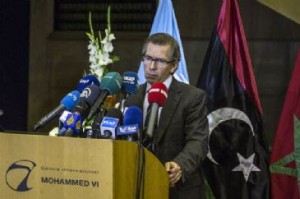Tripoli Post
UN envoy to Libya said Sunday that rival parties have reached ‘consensus’ on the main elements of an agreement. But Tripoli faction’s insistence on backtracking on an agreement initialed on 12 July will further erode trust in Bernardino Leon as peace broker and jeopardize the whole process.
“After long hours of discussions, we have reached what we consider is a consensus on the main elements,” Leon told reporters in the Moroccan city of Skhirat.
Leon said eight points of difference remain unsolved and made it clear that he was somehow pressuring the legitimate government to abandon the 12 July initialed agreement by accepting amendments that have been introduced by the Tripoli faction.
The round of talks that began last Thursday and ended Sunday morning was meant to solve differences between the internationally recognized government in eastern Libya and the Tripoli faction, dominated by Fajr Libya which is an alliance of extremist militias that openly support Islamic State and Al Qaeda terrorists.
When asked by a reporter whether the said amendments are to be introduced to the text of agreement that was initialed on 12 July, Leon was not straightforward.
“…if both sides agreed – the House of Representatives and the Congress in Tripoli – will agree with this proposals will also amend the text in not very important points, in some, I would say, around four, five very concrete points. I would say that small amendments, no big changes,” he said.
“So the basis of the text remains the same, with some amendments. Now the nine remarks that were proposed by the Congress have been introduced, have been addressed in this whole package, and the whole package, of course, means the final provisions, the annexes and also the main text,” he added.
Leon recognizes that the concessions he is demanding from the representatives of the legitimate government and all other political forces that initialed the 12 July text are rather difficult.
“Now we know for the parties that signed on 12 July here in Skhirat this is not an easy decision.” Leon said.
He said he was counting on the “generosity” of these parties to make these concessions “even if we can understand that they feel disturbed, and they feel frustrated because this text will have some changes.”
In other words, observers of the Libyan political process believe that the representatives of the legitimate government and the political forces which initialed the 12 July text have been pressured to abandon an agreed upon agreement and the spoilers of the peace efforts have been rewarded instead of being sanctioned.
On 12 July 2015, the UN Secretary-General Ban Ki-moon voiced encouragement at the initialing of such agreement by the stakeholders.
What is worrying the majority of the Libyan people is that despite the fact that it has been rather obvious that the Tripoli faction is acting as spoiler of the political peace process by refusing to come aboard, there are important international actors who are condoning and encouraging behavior.
Leon said on Sunday that he would be distributing the text of the agreement to the parties on Sunday. The representatives of the Tripoli rebel factions, he said, will be leave Skhirat for 48 hours to consult with their allies in Tripoli and will return with final answer.
Leon expects the final text will be signed on 20 September. This is the fifth draft to be submitted by the UN envoy to rival parties and it is most likely to be face rejections by some factions.
It has been almost a year since Leon has started his initiative of the so-called Libyan Political Dialogue on 21 September 2014, during which the security, political and economic situation in Libya has further deteriorated.
The latest turn of events in Skhirat could indeed jeopardize the political process in Libya even further.





